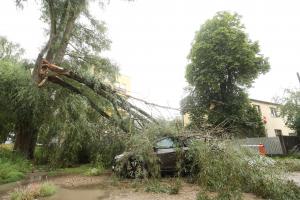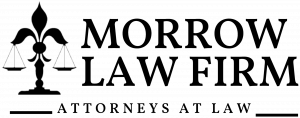
 Liability in these cases often turns on whether the property owner knew or should have known that the tree was hazardous”
Liability in these cases often turns on whether the property owner knew or should have known that the tree was hazardous”— John Michael Morrow, Jr. OPELOUSAS, LA, UNITED STATES, October 10, 2024 /EINPresswire.com/ -- Property damage caused by fallen trees is a common issue in Louisiana, particularly during hurricane season and periods of severe weather. Whether the tree falls on a home, vehicle, or other structures, determining liability and seeking compensation can become complex. Navigating the legal landscape of tree-related property damage in Louisiana requires an understanding of the laws that govern property ownership, negligence, and insurance coverage. John Michael Morrow, Jr., an attorney at Morrow Law Firm in Opelousas, Louisiana, offers insight into how property owners can address tree-related damage and what steps can be taken to protect their rights.
In Louisiana, property owners must be aware of both their rights and obligations when dealing with fallen trees, especially when determining who is responsible for the damage. This includes understanding key factors such as tree ownership, maintenance duties, and insurance policies that apply to property damage claims.
Ownership and Responsibility for Fallen Trees
Determining who is responsible for damages caused by a fallen tree typically starts with identifying the tree's owner. In general, the owner of the property where the tree is located is responsible for maintaining it and ensuring it does not pose a hazard to neighboring properties
.
However,
liability for damages may depend on whether the tree’s fall was foreseeable and preventable.
"Liability in these cases often turns on whether the property owner knew or should have known that the tree was hazardous," explains Morrow. If a tree is dead, diseased, or otherwise at risk of falling, the property owner may be held liable if it causes damage. Regular maintenance and inspections of trees are considered part of the property owner's responsibilities.
On the other hand, if a tree falls unexpectedly due to an act of nature, such as a hurricane, the situation may be treated differently. Natural disasters are generally considered unforeseeable events, meaning that the property owner may not be liable for damages. Instead, the impacted party will typically need to file an insurance claim to recover damages.
Types of Tree-Related Damage Fallen trees can cause a range of damage depending on where and how they fall. Common types of tree-related property damage include:
Structural Damage: A tree that falls on a home or other structure can cause significant damage, potentially leading to extensive repair costs. This type of damage typically requires insurance claims and may involve disputes over the amount of compensation.
Vehicle Damage: Trees can also fall onto vehicles, causing damage that can be costly to repair or result in a total loss. In these cases, vehicle insurance policies, particularly comprehensive coverage, may be necessary to cover the damages.
Damage to Personal Property: In addition to structures and vehicles, fallen trees can damage fences, sheds, landscaping, or other personal property. Determining how these types of damages are covered often requires a review of the relevant insurance policies.
Insurance and Claims Insurance coverage is a key component in addressing tree-related property damage. Homeowners’ insurance policies generally cover damage caused by fallen trees, provided that the tree fell due to an insured peril, such as wind or lightning . However, policy exclusions, coverage limits, and deductibles can affect the amount of compensation a property owner receives. Morrow emphasizes the importance of understanding the details of an insurance policy before filing a claim.
Insurance disputes can arise if there is a question of whether the tree was adequately maintained. If an insurance company believes that the tree was in poor condition and that the owner neglected to address a known risk, they may deny the claim or reduce the payout. To mitigate these risks, property owners should document the condition of their trees and any efforts made to maintain or remove potentially hazardous trees.
For vehicle damage caused by fallen trees, comprehensive auto insurance is typically required to cover the cost of repairs or replacement. Drivers without this type of coverage may have to bear the cost of repairs themselves, unless the tree owner’s negligence can be proven.
Legal Options for Damaged Parties When a tree from a neighboring property falls and causes damage, the affected property owner may have legal options for seeking compensation. If the tree owner was negligent in maintaining the tree or ignored warnings about the tree's condition, the injured party may be able to file a lawsuit to recover damages.
Negligence claims in tree-related property damage cases require proving that the tree owner knew or should have known that the tree posed a risk and failed to take appropriate action. Evidence of negligence could include complaints made to the tree owner about the tree's condition, prior incidents involving the tree, or expert testimony about the state of the tree before it fell.
Morrow advises that "the burden of proof in these cases can be challenging," as the injured party must provide sufficient evidence to establish negligence. Legal action may be necessary if an insurance claim is denied or if the property owner seeks additional compensation beyond what the insurance policy covers.
Preventative Measures and Legal Considerations Property owners can take proactive steps to minimize the risk of tree-related property damage. Regular tree inspections and maintenance, such as trimming branches and removing dead or diseased trees, can help prevent accidents and reduce the likelihood of legal disputes. If a property owner suspects that a neighboring tree is at risk of falling, communicating those concerns to the tree owner in writing may serve as a valuable record if damage occurs in the future.
Additionally, understanding local ordinances regarding tree maintenance and removal can help property owners avoid legal complications. In some areas, there may be regulations governing tree removal, particularly for large or historic trees.
Conclusion Property damage caused by fallen trees is a complex legal issue that requires a thorough understanding of ownership responsibilities, insurance coverage, and potential negligence claims. In Louisiana, property owners must be diligent in maintaining trees on their property to prevent them from becoming hazards to neighboring properties. When a tree does fall, determining liability and securing compensation can depend on a variety of factors, including the tree’s condition, the cause of the fall, and the specifics of the insurance policy.
Morrow Law Firm, led by William P. Morrow, John Michael Morrow, Jr., and Stephen M. Morrow, offers legal guidance to individuals facing tree-related property damage claims. Property owners and affected parties alike must take appropriate steps to protect their rights, document the damage, and pursue compensation when necessary. Understanding the legal framework and acting promptly can help minimize the financial impact of tree-related property damage in Louisiana.
Morgan ThomasRhino Digital, LLC+1 504-875-5036email us hereVisit us on social media:Facebook
Legal Disclaimer:
EIN Presswire provides this news content "as is" without warranty of any kind. We do not accept any responsibility or liability for the accuracy, content, images, videos, licenses, completeness, legality, or reliability of the information contained in this article. If you have any complaints or copyright issues related to this article, kindly contact the author above.
You just read:
News Provided By
October 10, 2024, 19:14 GMT
EIN Presswire's priority is author transparency. We do our best to weed out false and misleading content. The content above is the sole responsibility of the author who makes it available. If you have any complaints, kindly contact the author above.
Originally published at https://www.einpresswire.com/article/750728679/dealing-with-property-damage-from-fallen-trees-louisiana-legal-guide






